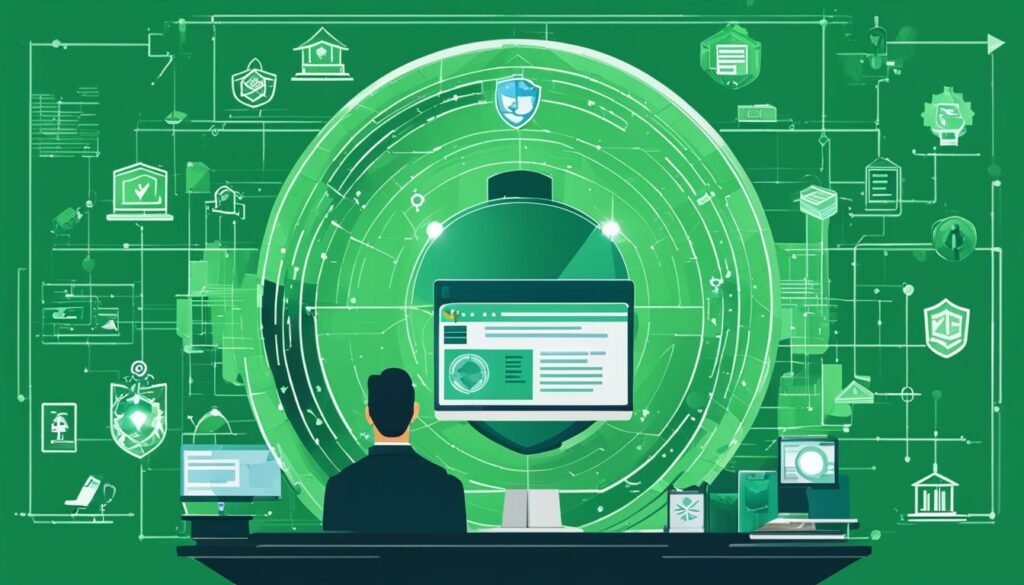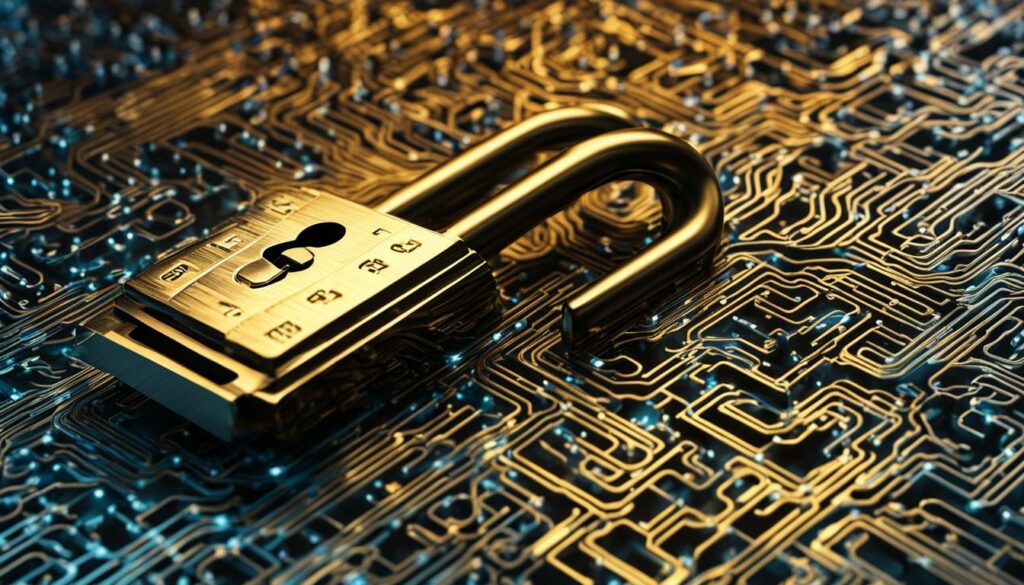Discover how using a VPN can enhance your online safety by encrypting network traffic and hiding your IP address. Let’s explore the factors that determine the security of a VPN and help you make an informed decision about safeguarding your online privacy.
Key Takeaways:
- Using a VPN can encrypt your network traffic and protect your online privacy.
- A VPN can hide your IP address and make it difficult for anyone to track your digital activities.
- Choosing a VPN provider with strong encryption protocols and a strict no-log policy is important for maximum security.
- A reliable VPN should offer features like a kill switch and secure authentication to enhance data protection.
- While a VPN can significantly enhance your online privacy, it is not a foolproof solution.
Can you be tracked with a VPN?
One of the primary concerns when it comes to online privacy is the ability for your activities to be tracked by third parties. However, with the use of a reputable VPN, you can significantly reduce the risk of being tracked. A VPN creates a secure and encrypted tunnel between your device and the internet, effectively hiding your IP address and making it difficult for anyone to monitor your online behavior.
By routing your internet traffic through the VPN server, your data becomes encrypted and your true IP address is masked. This means that even your Internet Service Provider (ISP) won’t be able to track your online activities. Additionally, VPNs prevent potential cyber threats from intercepting your data and monitoring your actions.
“Using a VPN provides a blanket of security that encrypts your online data, shielding your actions from being monitored or intercepted by Internet Service Providers (ISPs) or potential cyber threats.”
While utilizing a VPN greatly enhances your online privacy, it’s important to be aware of certain best practices. Accepting website cookies can still allow for some tracking, so it’s advised to be cautious with which cookies you accept. Additionally, minimizing the number of account sign-ins and regularly clearing your browser cache can further protect your privacy while using a VPN.
Table: Comparison of VPN Tracking and Online Tracking
| Tracking Method | VPN | Without VPN |
|---|---|---|
| Ability to track IP address | Masked and hidden | Visible and traceable |
| Monitoring by ISPs | Prevented | Possible |
| Potential for cyber threats to intercept data | Highly secure | Vulnerable to interception |
| Protection against online surveillance | Strong | Limited |
In conclusion, using a VPN can effectively protect you from being tracked online. With the encryption and IP address masking provided by a VPN, your online activities remain secure and private. However, it’s important to maintain good browsing practices and be mindful of potential tracking through cookies. By using a reputable VPN and following best practices, you can enjoy enhanced online privacy and security.
Who can track your digital activities?
Your digital activities can be tracked by multiple entities, including your Internet Service Provider (ISP), VPN companies, and government bodies. While using a VPN can provide an additional layer of security against ISP tracking and government surveillance, it’s important to understand the limitations of online privacy.
ISPs have the ability to monitor and collect data about your online activities, including websites visited, search history, and downloads. This data can be used for various purposes, such as targeted advertising or even surveillance. However, when you use a VPN, your internet traffic is encrypted and routed through a secure server, making it difficult for your ISP to monitor your online activities.
VPNs themselves have the potential to track your digital activities. Some VPN providers may log your data, including your IP address, online activities, and connection timestamps. It’s crucial to choose a VPN provider with a strict no-log policy to ensure your privacy and prevent any potential tracking.
Government bodies also have the authority to track your online activities, especially in the context of national security. They may monitor internet traffic, access communication metadata, and even request data from ISPs and VPN providers. While VPNs can help protect your privacy from government surveillance to some extent, it’s important to understand that they are not immune to such monitoring.
Protecting your online privacy
“Using a VPN can provide an additional layer of security against ISP tracking and government surveillance.”
To enhance your online privacy and protect your digital activities, it’s essential to choose a reputable VPN provider that prioritizes user privacy and has a strict no-log policy. Additionally, adopting good online privacy practices such as using strong passwords, enabling two-factor authentication, and being cautious of the websites you visit can further protect your data.
While using a VPN can help safeguard your online privacy, it’s important to stay informed about the latest developments in technology and security measures to ensure you are taking the necessary steps to protect your digital footprint.
| Entity | Tracking Capability |
|---|---|
| ISP (Internet Service Provider) | Can monitor and collect data about your online activities, including websites visited, search history, and downloads. |
| VPN Provider | Can potentially log your IP address, online activities, and connection timestamps. Choose a VPN with a strict no-log policy. |
| Government Bodies | Have authority to track online activities, especially in the context of national security. They may monitor internet traffic, access communication metadata, and request data from ISPs and VPN providers. |
How to Select the Most Secure VPN
When it comes to safeguarding your online privacy, selecting a secure VPN is crucial. Here are some key factors to consider:
- VPN Features: Look for VPNs that offer advanced security features like IP address leak prevention and DNS leak prevention. These features ensure that your real IP address and DNS queries are not exposed, enhancing your anonymity and privacy.
- No-Log Policy: A strict no-log policy means that the VPN provider does not collect or store any logs of your online activities. This ensures that there is no record of your browsing history, providing an extra layer of privacy.
- Kill Switch: A Kill Switch is a vital feature that automatically disconnects your internet connection if the VPN connection drops. This prevents your data from being exposed to your ISP or other potential threats.
By considering these factors, you can make a more informed decision and choose a VPN that prioritizes your security and privacy.

Table: Comparison of Secure VPN Features
| VPN Provider | IP Address Leak Prevention | DNS Leak Prevention | No-Log Policy | Kill Switch |
|---|---|---|---|---|
| Provider A | Yes | Yes | Yes | No |
| Provider B | Yes | Yes | Yes | Yes |
| Provider C | No | No | Yes | Yes |
Is a VPN a Guaranteed Solution for Privacy?
While using a VPN can significantly enhance your online privacy, it is important to understand its limitations. A VPN provides a secure and encrypted connection, preventing prying eyes from intercepting your data and hiding your true IP address. However, it is not a foolproof solution that guarantees complete privacy.
There are certain online privacy risks that a VPN may not fully protect you from. Persistent trackers, such as cookies or fingerprinting techniques, can still track your online activities even when using a VPN. These trackers can gather information about your browsing habits, interests, and preferences. Additionally, while a VPN can protect your data in transit, it cannot secure the personal information you willingly share on websites or through other means. It is important to remain cautious and mindful of the information you disclose online.
Furthermore, VPNs vary in their privacy policies and security measures. Some VPN providers may log your online activities, defeating the purpose of using a VPN for privacy. It is crucial to choose a VPN provider with a strong commitment to user privacy and a strict no-log policy. Thoroughly research and select a reputable VPN provider that aligns with your privacy needs and requirements.
VPN Limitations
While a VPN provides an extra layer of security and privacy, it is essential to acknowledge its limitations. Here are some key VPN limitations to consider:
- A VPN does not inherently protect you from phishing attacks, malware, or other online threats. You still need to maintain good cybersecurity practices, such as using strong passwords and keeping your devices up to date.
- Using a VPN may slow down your internet connection speed due to the encryption process and distance to the VPN server.
- Access to certain websites or online services may be restricted when using a VPN, particularly if the VPN server is located in a country with strict internet censorship.
It is important to weigh the benefits and limitations of using a VPN and assess your specific privacy needs. By understanding its capabilities and limitations, you can make an informed decision about integrating a VPN into your online privacy strategy.
| VPN Privacy Guarantee | Online Privacy Risks | VPN Limitations |
|---|---|---|
| Enhances online privacy through encryption and IP address hiding | Persistent trackers can still gather information about your online activities | A VPN does not protect against phishing attacks or malware |
| Secures data in transit, preventing interception by third parties | Shared personal information may still be vulnerable | A VPN may slow down internet connection speed |
| Provides an additional layer of security against surveillance | Varies in privacy policies and no-log guarantees | Access to certain websites may be restricted |
The role of encryption in VPN security
Encryption plays a crucial role in ensuring the security of a VPN. By encrypting network traffic, VPNs protect your data from being intercepted or accessed by unauthorized parties. The strength of the encryption used by a VPN is a key factor in determining its security level. One widely recognized encryption technology used by VPNs is AES 256-bit encryption. This advanced encryption standard is considered highly secure and virtually unbreakable, providing a strong shield for your data.
With AES 256-bit encryption, your data is encrypted using a complex algorithm that requires an immense amount of computational power to crack. This ensures that your sensitive information, such as passwords, financial details, and personal messages, remains safeguarded during transmission. The encryption process transforms your data into an unreadable format that can only be deciphered by the intended recipient with the correct decryption key. As a result, VPNs employing AES 256-bit encryption offer a secure channel for your online activities, protecting your privacy and preserving the integrity of your data.
It’s important to note that encryption alone does not guarantee complete security. Other factors, such as the VPN provider’s infrastructure and security protocols, also play a significant role. However, encryption serves as the foundation for VPN security, ensuring that your data remains confidential and secure as it travels through the VPN tunnel.

Table: Comparison of VPN Encryption Technologies
| Encryption Technology | Strength | Key Features |
|---|---|---|
| AES 256-bit | Highly secure | – Widely used encryption standard – Virtually unbreakable – Provides strong data protection |
| OpenVPN | Secure | – Uses OpenSSL library – Supports various encryption algorithms – Offers robust security |
| WireGuard | Fast and secure | – Designed for speed and efficiency – Utilizes modern cryptographic techniques – Provides strong encryption |
In addition to encryption, VPNs employ various security protocols to enhance data protection. These protocols define how data is transmitted and secured within the VPN network. By combining strong encryption with secure protocols, VPNs ensure that your data remains confidential, even when traversing potentially insecure networks.
IP Address Masking and Server Locations
One of the key benefits of using a VPN is the ability to mask your IP address, providing an additional layer of privacy and security. When you connect to a VPN server, your internet traffic is routed through that server, effectively hiding your true IP address from prying eyes. This IP address masking makes it much harder for anyone to track your online activities.
In addition to IP address masking, the server locations offered by a VPN provider are also crucial for enhancing your online privacy. By connecting to servers located in different countries, you can effectively change your virtual location and access content that may be restricted in your own country. The more server options a VPN offers, the greater flexibility you have in choosing an IP address from a location that suits your needs.
| VPN Provider | Number of Server Locations |
|---|---|
| VPN A | 50+ |
| VPN B | 100+ |
| VPN C | 200+ |
The table above demonstrates the number of server locations offered by different VPN providers. As you can see, VPN C provides the most extensive network of servers, giving you a wide range of options when it comes to selecting IP addresses. This can be particularly useful if you require a specific location for accessing region-restricted content or if you want to ensure a higher level of anonymity.
When choosing a VPN, consider the importance of IP address masking and the availability of server locations. These features play a vital role in safeguarding your online privacy and providing you with greater control over your internet connection.
Importance of a zero-log policy
When considering a VPN for your online privacy needs, one crucial factor to consider is the provider’s zero-log policy. A zero-log policy ensures that your VPN provider does not collect, use, or disclose any data that could be used to personally identify you. This policy is essential for safeguarding your data privacy and maintaining your online security.
By choosing a no-log VPN, you can have peace of mind knowing that your browsing history, online activities, and personal information are not being recorded or stored. This means that even if a third party were to gain access to the VPN provider’s servers, there would be no user data available to compromise your privacy.
A zero-log policy is especially important if anonymity and data security are your top priorities. It ensures that your digital footprint remains untraceable and minimizes the risk of your information falling into the wrong hands. When selecting a VPN provider, always check for their logging policies and choose one with a clear commitment to user privacy and data protection.
| Benefits of a zero-log policy: | Drawbacks of a no-log VPN: |
|---|---|
|
|
“A zero-log policy ensures that your VPN provider does not collect, use, or disclose any data that could be used to personally identify you.”
It’s important to note that while a zero-log policy is a significant security measure, it’s essential to combine it with other security features such as encryption and secure authentication methods. Additionally, regularly updating your VPN software and practicing good online hygiene, such as avoiding suspicious websites and using strong, unique passwords, will further enhance your data privacy and security.
Overall, choosing a VPN provider with a zero-log policy is crucial for protecting your data privacy and ensuring that your online activities remain confidential. By selecting a reputable VPN service with robust security measures, you can enjoy a safer and more secure online experience.

Additional Security Features to Consider in a VPN
When selecting a VPN for your online privacy and security needs, it is important to consider the additional security features that each provider offers. These features can add an extra layer of protection to safeguard your data and ensure a secure browsing experience.
1. Kill Switch
A kill switch is a crucial security feature that you should look for in a VPN. It automatically cuts off your internet connection if the VPN connection drops, preventing your data from being exposed to potential threats. This ensures that your online activities remain private even in the event of a network interruption.
2. Secure Authentication
Secure authentication methods, such as multi-factor authentication, add an extra layer of protection to your VPN account. By requiring multiple factors, such as a password and a unique code sent to your mobile device, it significantly reduces the risk of unauthorized access to your account and enhances the overall security of your VPN connection.
3. Encryption Protocols
A reliable VPN should offer a variety of encryption protocols to choose from. These protocols determine the level of encryption used to secure your data transmission. Look for VPNs that offer industry-standard encryption, such as AES 256-bit encryption, which provides a high level of protection against unauthorized access to your data.
Implementing these additional security features can significantly enhance the security and privacy of your online activities. When choosing a VPN, consider the specific security needs and priorities that are important to you, and select a provider that offers the features that align with those needs.
Trust and Reputation in VPN Selection
When choosing a VPN, one of the crucial factors to consider is the trust and reputation of the provider. You want to ensure that you entrust your online privacy and security to a reputable VPN company that values transparency and user trust. Here are some essential aspects to consider:
1. Robust Network Infrastructure:
A reputable VPN provider should have a strong network infrastructure. This includes a wide range of server locations strategically placed worldwide. Having multiple server options allows you to enhance your online privacy by disguising or rerouting your IP address through different locations.
“A robust network infrastructure enables the VPN provider to offer reliable and secure connections, ensuring that your data remains protected.”
2. Strong Security Records:
Look for VPN companies with a proven track record in security. Check if they have experienced any data breaches or incidents in the past. Independent security audits can also provide valuable insights into the provider’s security practices and help evaluate their commitment to protecting user privacy.
3. Open Transparency:
Transparency is key when it comes to choosing a VPN. A transparent VPN company will clearly outline their data handling policies, explain how they protect user information, and have a strict no-log policy in place. It is essential to thoroughly review the provider’s privacy policy and terms of service to understand how they handle user data.
| Aspects to Consider in VPN Selection | Trust and Reputation |
|---|---|
| Robust Network Infrastructure | ✓ |
| Strong Security Records | ✓ |
| Open Transparency | ✓ |
Conclusion
In conclusion, while using a VPN can certainly enhance your online privacy, it is important to understand its limitations and potential risks. A VPN provides encryption and IP address masking, making it harder for third parties to track your digital activities. However, it is not a foolproof solution and persistent trackers may still be able to trace your movements.
When selecting a VPN, prioritize providers with strong security measures, transparent logging policies, and a commitment to user privacy. Look for features such as IP address leak prevention, DNS leak prevention, and a kill switch to enhance your data security. Additionally, consider VPN companies with a trusted reputation and a history of independent security audits.
Remember that a VPN should not be relied upon as the sole solution for protecting your online privacy. It is crucial to practice good digital hygiene, such as minimizing account sign-ins and being mindful of website cookies. Ultimately, a combination of security measures, including a reputable VPN, can help safeguard your online activities and protect your personal information.
FAQ
Are VPNs safe for your online privacy?
Utilizing a VPN provides a blanket of security that encrypts your online data, shielding your actions from being monitored or intercepted by Internet Service Providers (ISPs) or potential cyber threats.
Can you be tracked with a VPN?
While a VPN can provide an additional layer of security against ISP tracking and government surveillance, persistent trackers may still be able to trace your movements.
Who can track your digital activities?
Your Internet Service Provider (ISP), VPN companies, and government bodies can track your digital activities under certain conditions.
How to select the most secure VPN?
Key indicators of a reliable VPN include IP address leak prevention, DNS leak prevention, and a strict no-log policy. Look for VPNs that offer features like Kill Switch to enhance your data security.
Is a VPN a guaranteed solution for privacy?
While a VPN can significantly enhance your online privacy, it is not a guaranteed solution. It’s essential to choose a VPN provider with strong privacy principles and security measures.
What is the role of encryption in VPN security?
Encryption is the most integral feature of a VPN. Look for providers that use state-of-the-art encryption technology, such as AES 256-bit encryption, to ensure a secure connection for your online activities.
How does IP address masking and server locations impact online privacy?
A good VPN should allow you to disguise or reroute your IP address by connecting to remote servers. Look for VPN providers with a wide range of server locations to enhance your online privacy and provide more options for choosing IP addresses.
Why is a zero-log policy important?
A zero-log policy ensures that your VPN provider does not collect, use, or disclose any data that can be used to personally identify you. Choosing a VPN with a transparent logging policy is crucial for protecting your identity and maintaining your online privacy.
What are some additional security features to consider in a VPN?
A reliable VPN should offer additional security features such as a kill switch, which cuts off your internet access if the VPN connection drops. Secure authentication methods like multi-factor authentication add an extra layer of protection to safeguard your data.
How important is trust and reputation in VPN selection?
When choosing a VPN, it’s important to consider the provider’s trust and reputation. Look for VPN companies with robust network infrastructure, strong security records, and open transparency.
Is a VPN the ultimate solution for online privacy?
While a VPN can enhance your online privacy, it is not a foolproof solution. It is essential to consider the limitations and risks associated with VPN usage. Prioritize VPN providers with transparency, strong security measures, and a commitment to user privacy to ensure optimal protection for your online activities.






